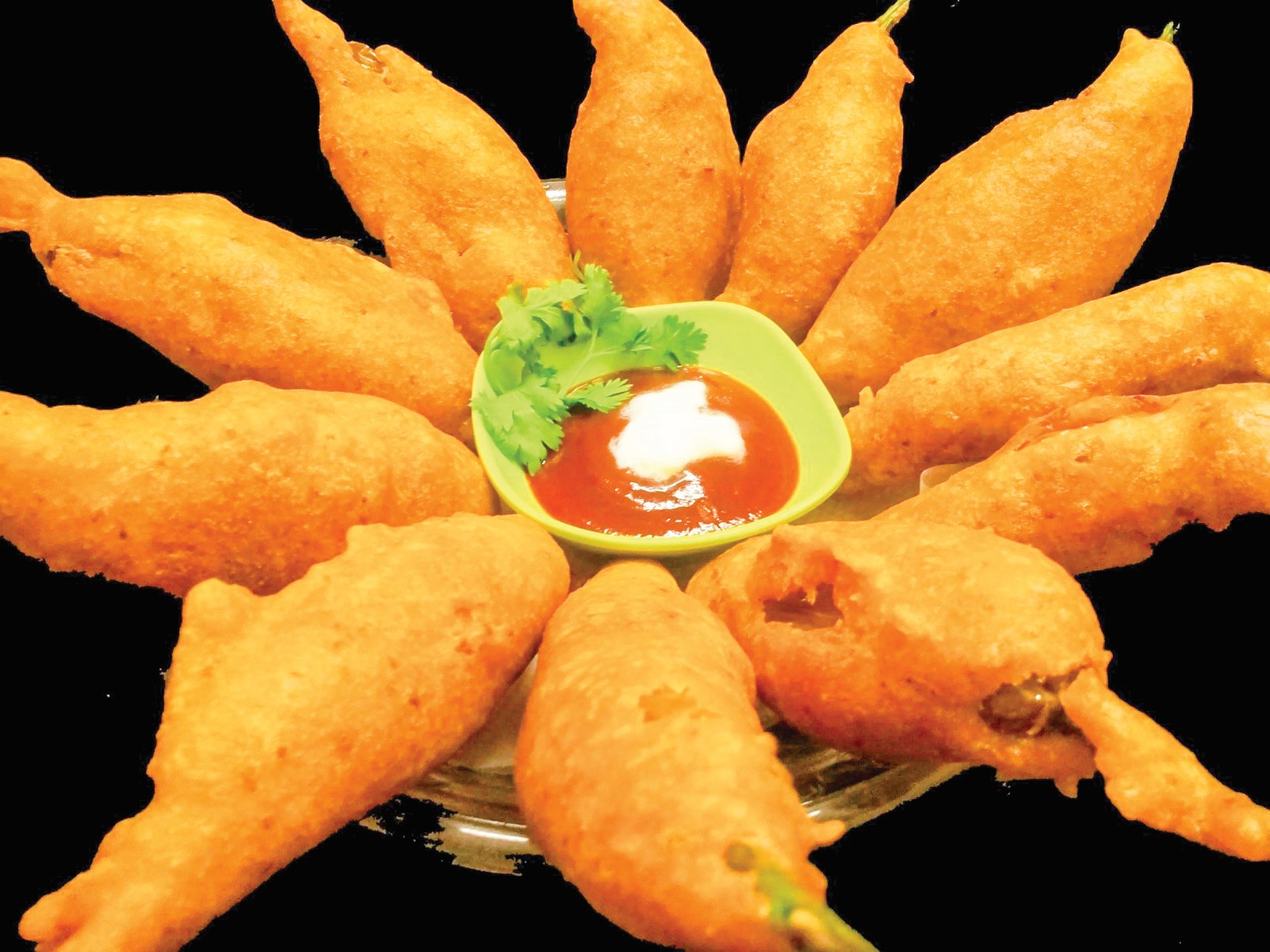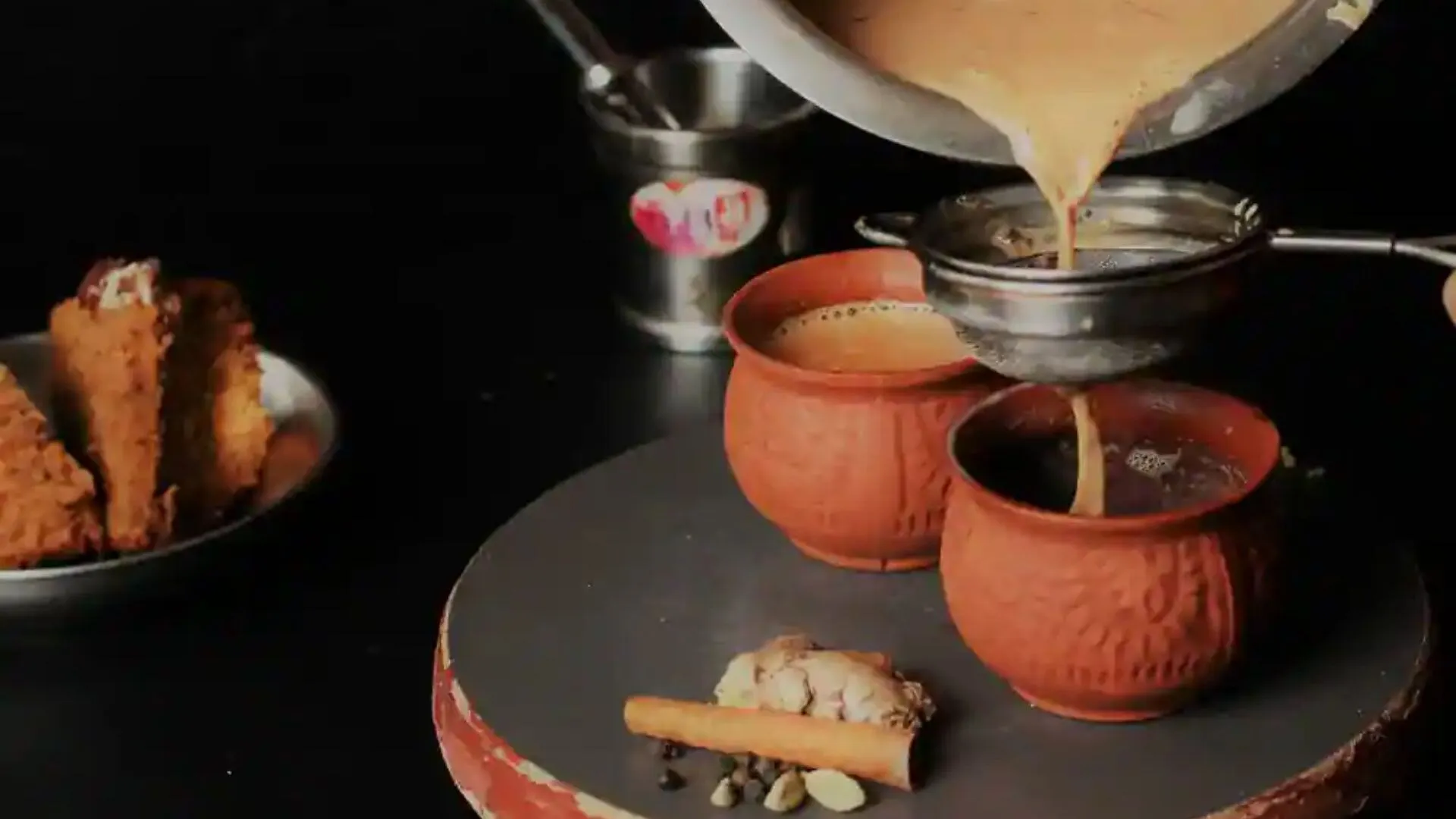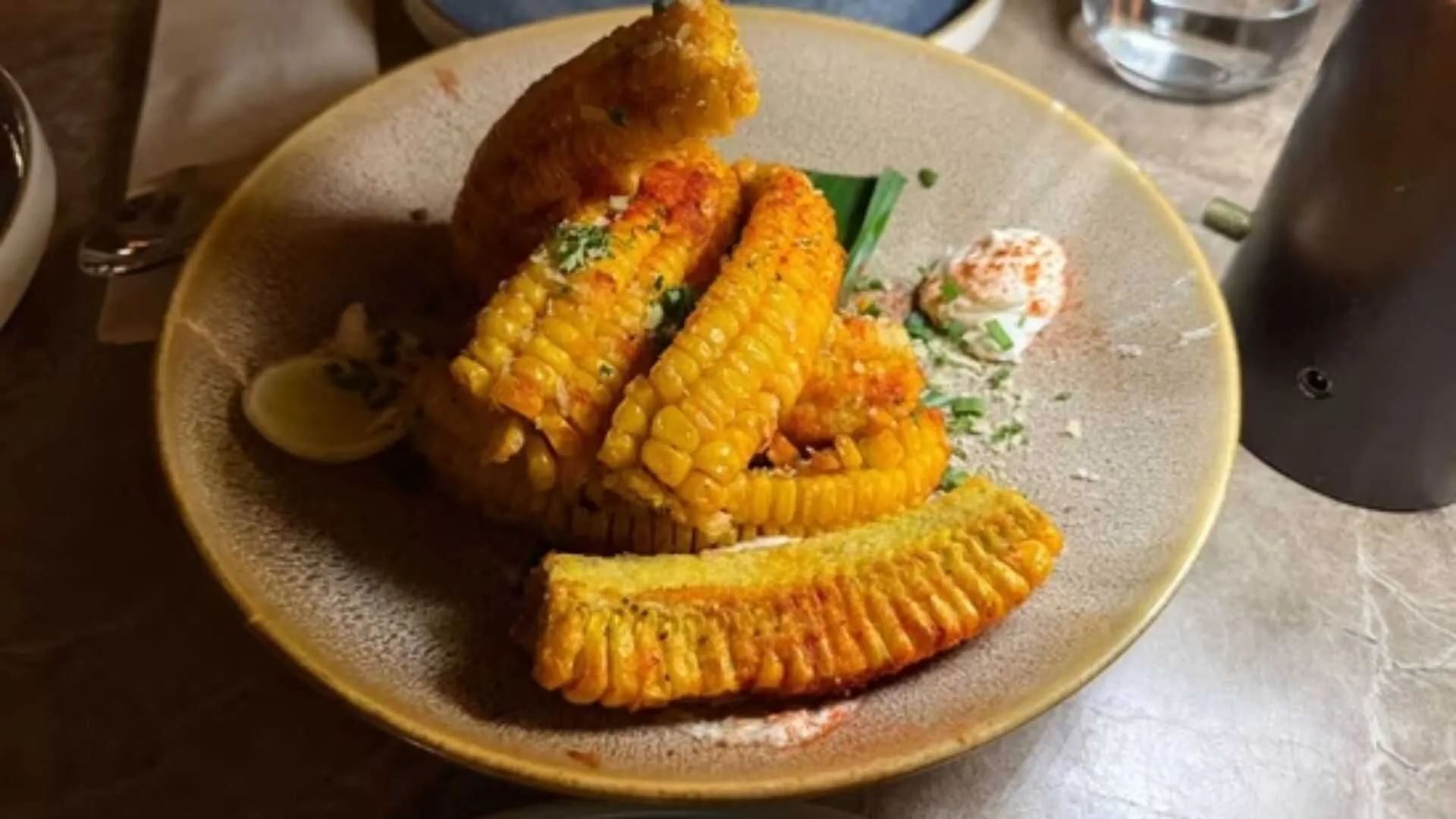The Blue City, as it is popularly called, has a distinct cuisine culture that reflects its past as a key stop on the old spice route, as well as its status as Rajasthan’s second biggest city. Each daybreak brings the promise of tasty food experiences and pleasures that have enthralled foodies for generations.
Morning Magic, The Famous Clock Tower Breakfast
The day begins at Ghanta Ghar (Clock Tower), where the aroma of freshly fried mirchi vadas mingles with the fragrant steam of masala chai. Jodhpur’s version of mirchi vada is distinctively different using the local Mathania mirch; these chilis are larger and more pungent than those found elsewhere in Rajasthan. The stuffing is unique too, incorporating crushed coriander seeds and a secret blend of spices that vendors guard zealously.
The real star of a Jodhpur breakfast, however, is the legendary Makhania Lassi. This isn’t your ordinary lassi; it’s so thick that it’s served with a spoon and topped with a generous crown of homemade white butter. Local lore says that the lassi was created centuries ago to help warriors combat the desert heat before battle.
The Mathania Mirch Trail
Midmorning is perfect for exploring the spice bazaars around Sardar Market, where mounds of the famous Mathania chilies create a sea of red. These chilies, grown in the nearby village of Mathania, are what give Jodhpuri cuisine its distinctive fieriness. Watch as vendors grind these precious chilies into powder, filling the air with their potent aroma. Many local dishes, from kadhi to laal maas, derive their unique character from these special chilies.
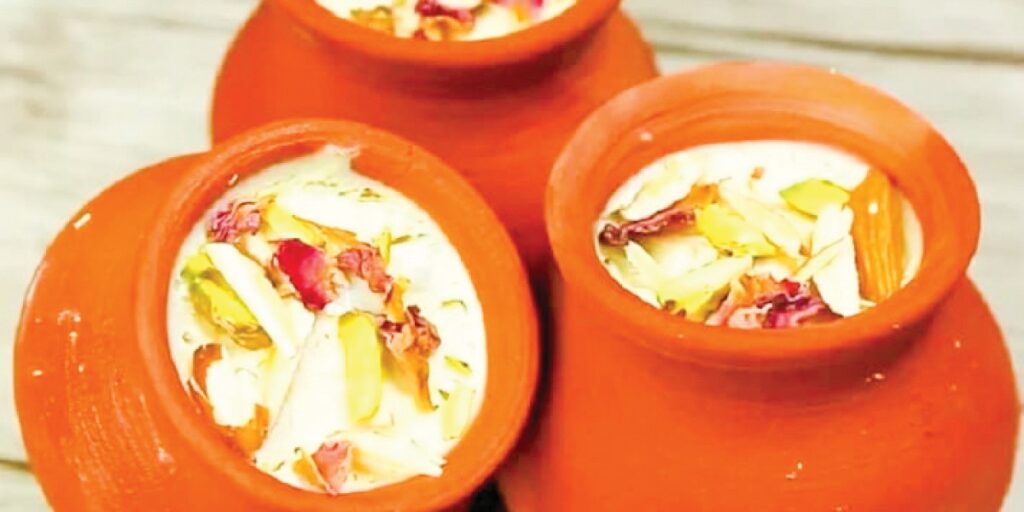
Marwari Marvels, A Desert Feast
Jodhpur’s position in the Thar Desert has shaped its cuisine in fascinating ways. The city’s famous kabuli, spiced mashed potato patties coated with mangodi (sun dried moong dal dumplings) before frying, showcases how locals transformed simple ingredients into extraordinary dishes. The crispy exterior gives way to a spiced potato filling that’s distinctively Jodhpuri, seasoned with dried pomegranate seeds and fresh green chilies.
The Blue City’s Special, Keema Baati
While Dal baati is found across Rajasthan, Jodhpur’s keema baati is unique to the city. These hearty wheat dough balls are stuffed with spiced minced meat before being baked in traditional ovens. Served with ghee and garlic chutney, this dish represents the meeting of Rajput and Marwari food traditions.
Bazaar Treasures, Navchokiya’s Street Food
The lanes of Navchokiya offer specialties you won’t find elsewhere. Try the panchkuta, a dish made from five different dried desert vegetables and berries, an impression of the desert preservation techniques. The local version of chakki ki sabzi uses a special dough made with semolina instead of wheat flour, giving it a distinctive texture.
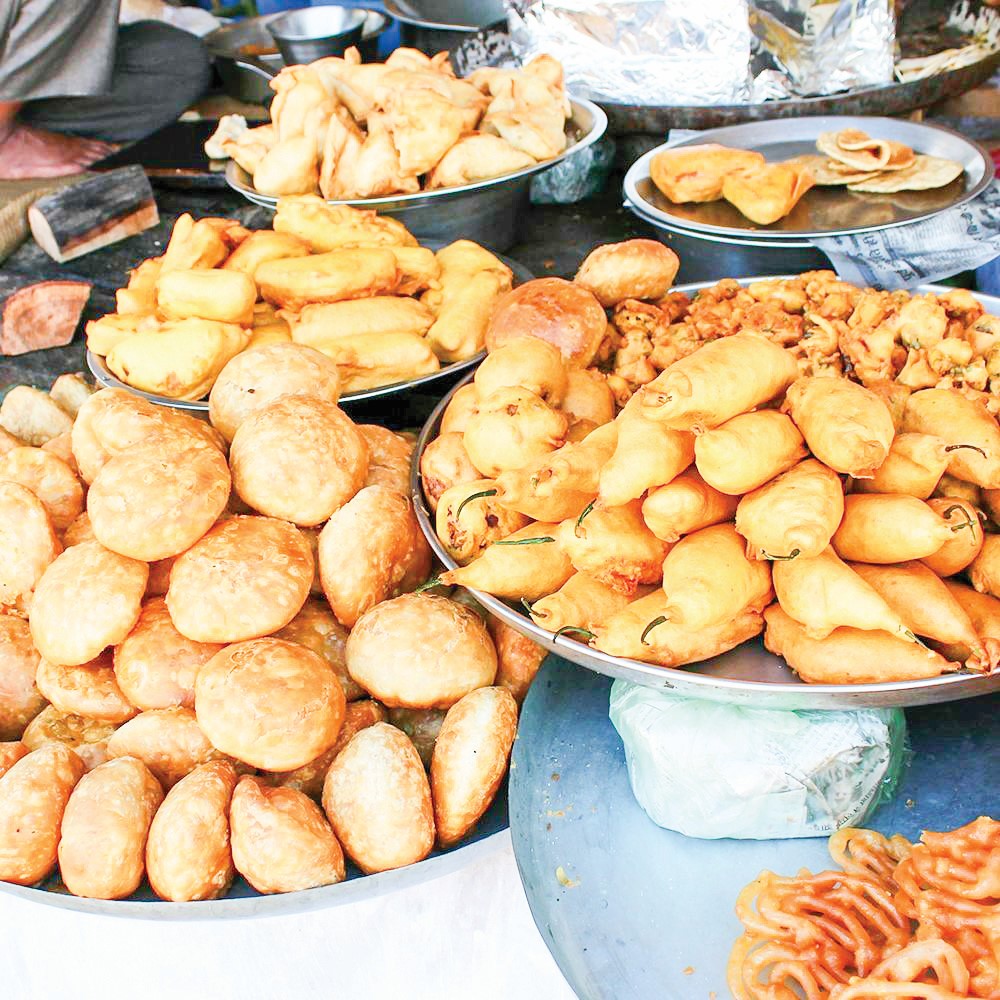
Sweet Secrets of the Blue City
Jodhpur’s sweets deserve special mention. The city’s mawa kachori is different from Jaipur’s; it’s smaller, crispier, and filled with a unique mixture of mawa, dried fruits, and cardamom. But the true Jodhpuri special is pyaaz ki kachori, where the filling includes caramelized onions mixed with dried mango powder, creating a sweet sour spicy blend that’s addictively delicious.
Sunset Specials, Ghanta Ghar Comes Alive Again
As evening approaches, the Clock Tower area transforms again. This is when you’ll find vendors serving gulab jamun ki sabzi, a revolutionary dish where the sweet dumplings are transformed into a savory curry. It’s served with missi roti, a spiced flatbread made with gram flour that’s particularly popular in Jodhpur.
The Royal Kitchen Legacies
Jodhpur’s royal cuisine deserves exploration too. The city’s safed maas is different from other versions, made with nutmeg and white peppercorns instead of the usual spices. The local jungli maas uses only two ingredients besides meat, ghee and those famous Mathania chilies, creating a dish of stunning simplicity and depth.
Beyond the typical food delicacies
Venture into the old city’s narrower lanes to find treats like bajre ka khichda (a rich pearl millet and lentil porridge) and raab (a warming winter drink made from millet flour and buttermilk). These dishes showcase how Jodhpur’s cooks transformed humble grains into comforting meals.
A Food Explorer’s Guide
The best time for exploration is early morning (7-10 AM) and evening (4-7 PM). The must try unique dishes are Makhania lassi, Keema baati, and Gulab jamun ki sabzi. As far as the local specialties are Mathania mirch based dishes, pyaaz kachori, and panchkuta, and the seasonal delights are Raab and bajre ka khichda (winter) and makhaniya lassi (summer).
The Art of Pickle Making, Jodhpur’s Preserved Treasures
One cannot write about Jodhpur’s food culture without mentioning its famous pickles. The city’s dry climate and abundant sunshine created perfect conditions for pickle making, leading to unique preparations found nowhere else. The ker pickle, made from desert berries, combines sweet, sour, and spicy flavors in perfect harmony. Local households still sun-dry vegetables and fruits on their terraces during summer, preparing for the months ahead. The famous red chili pickle, made specifically with Mathania chilies, is a testament to how Jodhpur transformed its fierce sun from a challenge into an advantage.
The Old City’s Secret Recipes
The khoba roti, for instance, is a flatbread with intricate patterns created by skillful finger impressions, each depression holding precious ghee. Another local specialty is the boondi curry, where tiny droplets of gram flour batter are fried and then simmered in a yogurt-based gravy spiced with local masalas.
The Influence of Marwari Culture
Jodhpur’s large Marwari community has significantly influenced its cuisine. Their emphasis on vegetarian cooking led to innovations like the badam pyaaz ki sabzi, where almonds and onions are combined in a rich gravy. The community’s expertise in using dried ingredients resulted in dishes like papad ki sabzi, where papad is transformed into a curry, and sangri ki sabzi, made from desert beans that can last for months.
Contemporary Jodhpur isn’t just preserving its food culture; it’s evolving it. Creative chefs are making fusion dishes like mathania mirch ice cream and ker sangri stuffed pasta. The city’s famous Makhaniya Lassi has inspired new desserts, including Lassi cheesecake and Lassi kulfi.
The Craft of Spice Blending
Every Jodhpuri kitchen has its own spice blends, with recipes passed down through generations. The local garam masala differs from other regions, incorporating more coriander seeds and black cardamom. The famous dhaniya jeera powder of Jodhpur includes roasted watermelon seeds, giving it a unique nutty flavor.
Community and Food, The Social Aspect
During festivals like Gangaur and Diwali, neighborhoods come alive with food sharing traditions. The practice of “sanjha chulha” (community cooking) still exists in some old city areas, where families take turns cooking for each other, ensuring that traditional recipes are preserved and passed on.
Each dish tells a story of adaptation, preservation, and creativity. Whether it’s the use of dried vegetables, the unique spice blends, or the transformation of simple ingredients into complex flavors, Jodhpur’s food culture stands distinct from its Rajasthani cousins.
As you wander through the blue washed streets, trying out these unique flavors, you’re experiencing more than just food; you’re tasting centuries of tradition, innovation, and the desert’s influence. The city’s culinary heritage, much like its mighty fort, stands as epitome to the enduring spirit of Marwar.

